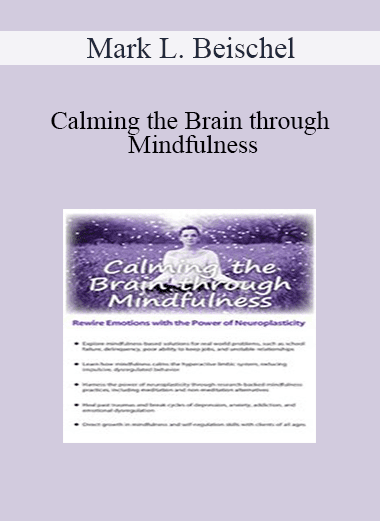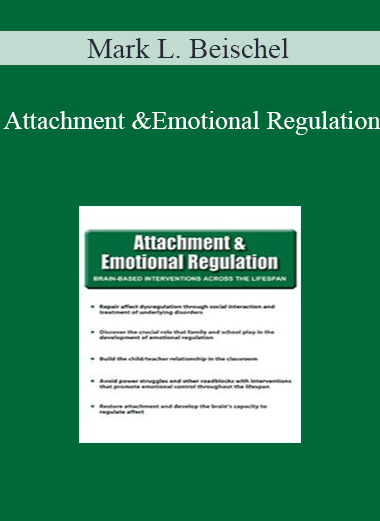[Download Now] Attachment and Emotional Regulation – Mark L. Beischel
$199.00 Original price was: $199.00.$50.00Current price is: $50.00.
[Download Now] Attachment and Emotional Regulation – Mark L. Beischel
Product Delivery: You will receive a download link via your order email immediately
Should you have any question, do not hesitate to contact us: [email protected]
[Download Now] Attachment and Emotional Regulation – Mark L. Beischel
Affect Regulation and the Developing Brain
Mental health professionals, educators, and parents are often confronted with children, adolescents, and adults who either show no affect or inappropriate affect in social situations. A good body of research, starting with the work of John Bowlby and Mary Ainsworth, now suggests that the capacity of affect regulation is developed very early in life. An infant’s ability to handle stressful changes in the external environment is developed by being exposed to regulation of the infant’s shifting arousal levels. When this does not happen, attachment is insecure and an unstable self-system develops with poor capacity to regulate affect.
This recording will address crucial issues relating to the neurobiological and cognitive bases of emotional regulation; how regulatory strategies are developed and used across the lifespan; social-psychological approaches; individual dissimilarities in emotion regulation tendencies; and implications for psychopathology, health, and clinical interventions. Various ways to modify damaged affect regulation will be examined.
You will recognize the importance in looking at how family functioning can protect or insulate youths who are insecurely attached. Social interventions in culturally different families and the role of religion as a stable force in affect regulation will be addressed. Gain insight into clinical interventions in different mental disorders such as externalizing disorders, anxiety and mood disorders, chemical dependency, and PTSD. You will leave the recording with a clear picture of the rapidly growing field of emotional regulation.
- Identify how insecurely-attached children have impaired brain development leading to anger and rage at home and at school
- Discover how attachment insecurity leads to problems of prediction, affect regulation, and conflict monitoring
- Explore how parenting and socialization in the family is either protective or debilitating
- Recognize that there are temperament and biological differences in the risk for insecure attachment and emotional control
- Utilize social interventions that are more positive than negative in building the capacity for trust
- Apply specific interventions that can be used to promote emotional control throughout the lifespan
GET ATTACHMENT AND EMOTIONAL REGULATION OF AUTHOR MARK L. BEISCHEL
Attachment Research & Affect Regulation
- Work of John Bowlby and Mary Ainsworth: attachment organization across the lifespan
- Allan Schore’s affect regulation and the orbital-frontal cortex
- Louis Cozolino’s work on attachment and the social brain—the healing relationship
Neuropsychological Bases of Emotional Regulation
- Prefrontal—amygdala interaction
- Neural basis
- Neural architecture
- Genetics
The Role of Cognitive Processes in Mood Regulation
- Prefrontal cortex and the executive functions
- Explanatory style and emotional regulation
- Affect regulation and forecasting
- Conflict monitoring and emotional regulation
Parenting and Family Functioning
- Parenting influences in early development
- Attachment and the evolution of families
- Socialization and emotional regulation in the family
- Nancy Eisenberg’s effortful control
- Emotional regulation and the aging brain
Individual Differences
- Temperament
- Individual differences and emotional control
- Intelligent emotional regulation
- Emotions and self-regulation
Social Interventions
- Proximity and touch in infant and early childhood treatment
- Non-conscious regulation
- Adult attachment strategies
- Interpersonal regulation
- Emotional regulation and the role of religio
Development of Affect Dysregulation
- Attachment theory
- Avoidant response
- Ambivalent response
- Disorganized response
- Secure response
- Development of insecure attachment through the life span
- Early childhood behaviors
- School age behaviors
- Adolescent behaviors
- Adult behaviors
- Measurement of secure and insecure attachment
- RADQ (Randolph Attachment Disorder Questionnaire)
- IPPA (Inventory of Positive Psychological Attitudes)
- TABS (Trauma and Attachment Belief Scale)
- Projective testing—play therapy model
- Inconsistent parenting
- Vulnerability of insecurely attached
- At risk children
- Protective influences
Clinical Interventions
- PTSD and emotional regulation
- Allan Schore’s application of self-psychology in repairing affect regulation
- Methods to avoid the power struggles
- The power of praise vs. acknowledgment
- Emotional regulation in externalizing disorders in children and adolescents
- ADHD
- ODD
- Conduct disorder
- Chemical dependency and affect regulation
- Marsha Linehan’s dialectical behavior therapy and emotional regulation
- Techniques for the school setting
- Techniques to enhance relationships between teachers and kids/teens
- Educational strategies to help kids focus and stay on task
- Effective behavior modification techniques to reduce angry outbursts at school
- Attachment based family therapy for adolescents
- Mindfulness, relaxation response
Psycho-Pharmaceutical Interventions: Indications and Contraindications
- Stimulants
- Antihypertensives
- Antipsychotics
Case Studies
GET ATTACHMENT AND EMOTIONAL REGULATION OF AUTHOR MARK L. BEISCHEL
Delivery Method
– After your purchase, you’ll see a View your orders link which goes to the Downloads page. Here, you can download all the files associated with your order.
– Downloads are available once your payment is confirmed, we’ll also send you a download notification email separate from any transaction notification emails you receive from IMC.sale.
– Since it is a digital copy, our suggestion is to download and save it to your hard drive. In case the link is broken for any reason, please contact us and we will resend the new download link.
– If you cannot find the download link, please don’t worry about that. We will update and notify you as soon as possible at 8:00 AM – 8:00 PM (UTC+8).
Thank You For Shopping With Us!
Be the first to review “[Download Now] Attachment and Emotional Regulation – Mark L. Beischel” Cancel reply
Related Products
Medical & Health
Medical & Health

![[Download Now] Attachment and the Dance of Sex: Integrating Couples and Sex Therapy – Susan Johnson](https://imc.sale/wp-content/uploads/2022/02/Attachment-and-the-Dance-of-Sex-Integrating-Couples-and-Sex-Therapy-–-Susan-Johnson-100x100.jpg)
![[Download Now] At an Impasse? Reduce the Likelihood of Escalating Behaviors Using A Sensory Framework – Robyn Otty](https://imc.sale/wp-content/uploads/2022/02/capture-899-100x100.jpg)
![[Download Now] Attachment and Emotional Regulation – Mark L. Beischel](https://imc.sale/wp-content/uploads/2022/02/Attachment-and-Emotional-Regulation-–-Mark-L.-Beischel.jpg)


![[Download Now] Attachment and Emotional Regulation – Mark L. Beischel](https://imc.sale/wp-content/uploads/2022/02/Attachment-and-Emotional-Regulation-–-Mark-L.-Beischel-100x100.jpg)
6 reviews for [Download Now] Attachment and Emotional Regulation – Mark L. Beischel
There are no reviews yet.